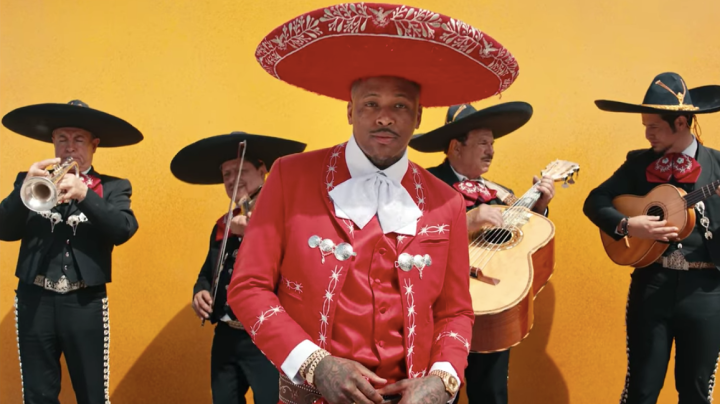YG’s Video for “Go Loko” Has People Arguing About What Constitutes Cultural Appropriation

"Go Loko" video still. Youtube.
With YG gearing up to release his 5th studio album 4 REAL 4 REAL, the Compton rapper dropped his latest video from the project, “Go Loko” ft. Tyga and Puerto Rican trapero Jon Z. The clip – which was released on Cinco de Mayo weekend – features YG in a full charro getup, with interspersed scenery depicting Los Angeles cholo culture in all its glory. Lowriders, Mexican flags, pachuco zoot suits, and the unmistakable work of Highland Park born and raised hair and makeup artist Lady Soulfly adorn the clip.
Even though the video has garnered a coveted co-sign by Drake, it’s also caused quite a stir online – with some people taking to Twitter to accuse YG of cultural appropriation, and of failing to feature a Mexican rapper on the song.
Other users were quick to point out their feelings of solidarity with the rapper, with some even pointing out that Mariachi music (and culture) can be traced back to black Mexicans in Jalisco. But the closeness doesn’t stop there. As we know, YG is from Compton – a neighborhood which has seen a transformation from predominantly black to Latino in recent years. Some elements of this video show the way in which the two communities co-exist in L.A.
Still, others added another layer of conversation in defending the rapper by pointing out the use of the N word by many non-Black Mexicans (and to an extent, Latinxs in general).

One user pointed out how YG is not spotlighting nor uplifting Mexican culture in the song, and should not be celebrated for essentially using the culture to pander to his large Latinx fan base, while bragging about his sexual conquest of Latina women.
Ultimately, the clip does raise a lot of questions about what is the proper way to approach use of another culture, but questions of appropriation generally involve a marginalized community’s culture being used by a systemically dominant group. Though there certainly are separate experiences and nuances to the way in which Black and Mexican cultures have been marginalized, to say that one of the cultures is in a significant place of power over the other would be inaccurate.
What are your thoughts on the matter? Let us know in the comments.
